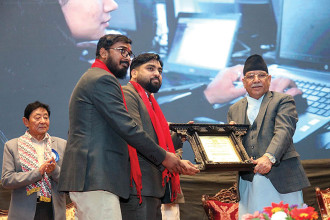
Raju Dhungel
Managing Director, Impressions
Raju Dhungel is a pioneering media entrepreneur and financial literacy advocate from Nepal. As the Managing Director of Impressions – A Creative Design and Banking News, he blends creative communication with purposeful advocacy to elevate public understanding of finance and economics.
Dhungel is the founder of Banking Sikshya, a national movement promoting financial literacy, and creator of National Banking Discourse, Nepal’s premier platform for dialogue between banking professionals, regulators and the public. His efforts have been widely recognised, including receiving the National Professional Achievement Award in 2021.
With over a decade of experience in branding, digital media, and event curation, Dhungel’s work continues to shape Nepal’s financial and media landscape – bridging institutions with the people they serve.
In this issue of Business 360, Dhungel speaks about the objective of launching National Banking Discourse. Excerpts:
What inspired you to initiate the National Banking Discourse? Was there a defining moment or gap in the industry that pushed you to launch this?
A void exists in advocacy, specifically in regulatory, consumer and financial advocacy, that has been overshadowed by industry interests. To address this, I developed Nepal Banking Discourse, a financial literacy initiative for Nepalis nationwide, in partnership with Nepal Rastra Bank. This programme also champions the banking industry.
My inspiration for Nepal Banking Discourse stemmed from visits to international banking exhibitions. Now, at the Third National Banking Discourse, we see significant participation from key entities within Nepal’s banking sector, including Nepal’s central bank, Ministry of Finance, National Planning Commission and Nepal Bankers’ Association.
Our objective is to bridge the existing gaps in knowledge, technology, and talent acquisition and retention. We achieve this by fostering relevant discussions through media channels and delivering comprehensive orientations to both practitioners and users of Nepali banking services. Moreover, National Banking Discourse provides valuable recommendations to Nepal Rastra Bank.
What are the core goals of this programme and how do you envision it evolving over time?
The National Banking Discourse tracks current developments to align Nepal’s banking sector with global standards. Our programme structure facilitates collaboration with diverse international knowledge partners, allowing us to discern global banking trends and, in turn, guide the trajectory of our domestic banking sector. In the near future, I plan to take this event to either Dubai or Singapore to foster collaboration, networking and knowledge exchange between Nepali and international bankers.
What impact will this programme have on Nepal’s banking industry in the short and long term?
Introducing neo-banking involves discussing the licensing, operational and structural formats necessary to advance digital banking. In the short term, we expect this to influence monetary flow for the next four decades. Long term, I foresee the banking discourse fostered by National Banking Discourse becoming the primary knowledge platform for innovative banking practices. Integrating AI into the existing banking infrastructure, to understand its potential effects, is facilitated through knowledge sharing with international banking entities. The impact of AI-driven products will also significantly enhance our banking market.
What problem in Nepal’s banking sector do you deem to be critical and what solution do you recommend?
I am a vocal advocate for cross-border payments to Nepal Rastra Bank. We are not only geographically landlocked but also financially restricted, unable to access our banking services abroad or invest outside our country. This approach by regulators is simply not forward-thinking. If Nepalis were allowed to use their cards internationally, regulators could easily track financial activities, enabling Nepal Rastra Bank to monitor spending without relying on informal channels. This would also prevent people from resorting to unconventional methods when spending in foreign markets. Nepal Rastra Bank can authorise legal channels immediately; the banking industry is prepared for millions of Nepalis to spend their own money abroad.




